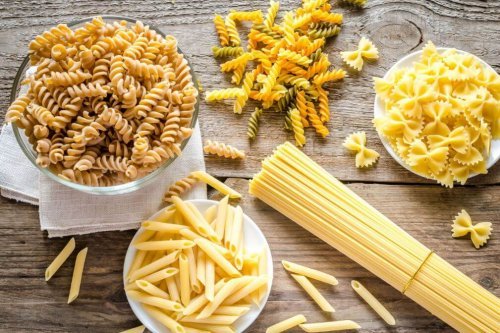Should We Eliminate Carbohydrates From Our Diet?

One of the first steps that many people usually take when they start training and incorporating good nutrition into their lives, is eliminating carbohydrates. There are many myths about this topic, but today we are going to uncover the facts. Let’s see if we really should eliminate them from our diet.
Are carbohydrates necessary?
Yes! Carbohydrates are necessary for our bodies. They carry out several primary functions:
- Energy. When we consume carbohydrates, they are used as an energy reserve and will produce the glucose that we may need at any given time. This means that if we consume the right amount of carbohydrates, they will burn easily.
- They store proteins. Carbohydrates act as fuel for our bodies, but when our bodies require more energy, carbohydrates help to store proteins to be able to feed muscles.
- They are necessary for our tissue development. Carbohydrates are used to form the tissues in our bodies connected with the nervous system.

- It helps to prevent ketone bodies. When we don’t consume carbohydrates, the body uses fat for energy and this leads to the creation of waste products, known as ketones. These can eventually produce cardiac arrhythmias and osteoporosis, among other complications. These ketone bodies are impossible to eliminate by themselves.
- The cellulose found in carbohydrates regulates intestinal transit, which is beneficial for many other functions, such as and for example, avoiding colon cancer.
What happens when we “almost” eliminate carbohydrates from our diet?
We have to keep in mind that not all carbohydrates are the same. Some can harm our health more than others, especially when consumed in excess, since it can lead to obesity.
We should avoid excesses, and only eat carbohydrates in moderation. We can do this by swapping carbohydrates, such as bread, rice, pasta, and flour, for legumes, whole grains, and nuts. The latter will give our bodies the necessary nutrients and we’ll obtain the following benefits:
We will burn fat
As mentioned before, storing carbohydrates creates an energy reserve. However, when we consume fewer amounts of them, our bodies will also begin to burn fat, which will be noticeable in our physique.
This can be a double-edged sword because ketone bodies appear if we only burn fat. For this reason, we must find the balance between the fats that we burn and the carbs that we consume.

You’ll be more satiated
Although many people believe that you have to go hungry in order to lose weight, this is a myth. The idea is to feel satiated, while eating less. One of the reasons that we want to eat more is because our sugar levels fall due to foods that generate insulin. This is what happens with carbohydrates.
Therefore, limiting our intake of carbohydrates and increasing healthy fats can help us to have less of an appetite, and we do not eat as much. Nuts provide both, hence, they are a good alternative to achieve this purpose and make an excellent snacking choice.
You’ll feed your muscles
Surely this is one of the benefits that you’ll like the most! Reducing the amount of carbohydrates that you consume and eating more proteins will feed your muscles. Carbohydrates don’t have any protein, so they won’t help you gain muscle mass.
Whenever we talk about avoiding or eliminating carbohydrates, we are referring to refined carbohydrates that are found in flour, sugar, or starch. As we have seen, carbohydrates are necessary for our bodies, so we must reduce our intake of refined foods and make sure we eat more of the good carbs, found in cereals, nuts, vegetables, and fruits.
If you follow these tips, your body will function like clockwork, while losing weight! This is your ultimate goal.
One of the first steps that many people usually take when they start training and incorporating good nutrition into their lives, is eliminating carbohydrates. There are many myths about this topic, but today we are going to uncover the facts. Let’s see if we really should eliminate them from our diet.
Are carbohydrates necessary?
Yes! Carbohydrates are necessary for our bodies. They carry out several primary functions:
- Energy. When we consume carbohydrates, they are used as an energy reserve and will produce the glucose that we may need at any given time. This means that if we consume the right amount of carbohydrates, they will burn easily.
- They store proteins. Carbohydrates act as fuel for our bodies, but when our bodies require more energy, carbohydrates help to store proteins to be able to feed muscles.
- They are necessary for our tissue development. Carbohydrates are used to form the tissues in our bodies connected with the nervous system.

- It helps to prevent ketone bodies. When we don’t consume carbohydrates, the body uses fat for energy and this leads to the creation of waste products, known as ketones. These can eventually produce cardiac arrhythmias and osteoporosis, among other complications. These ketone bodies are impossible to eliminate by themselves.
- The cellulose found in carbohydrates regulates intestinal transit, which is beneficial for many other functions, such as and for example, avoiding colon cancer.
What happens when we “almost” eliminate carbohydrates from our diet?
We have to keep in mind that not all carbohydrates are the same. Some can harm our health more than others, especially when consumed in excess, since it can lead to obesity.
We should avoid excesses, and only eat carbohydrates in moderation. We can do this by swapping carbohydrates, such as bread, rice, pasta, and flour, for legumes, whole grains, and nuts. The latter will give our bodies the necessary nutrients and we’ll obtain the following benefits:
We will burn fat
As mentioned before, storing carbohydrates creates an energy reserve. However, when we consume fewer amounts of them, our bodies will also begin to burn fat, which will be noticeable in our physique.
This can be a double-edged sword because ketone bodies appear if we only burn fat. For this reason, we must find the balance between the fats that we burn and the carbs that we consume.

You’ll be more satiated
Although many people believe that you have to go hungry in order to lose weight, this is a myth. The idea is to feel satiated, while eating less. One of the reasons that we want to eat more is because our sugar levels fall due to foods that generate insulin. This is what happens with carbohydrates.
Therefore, limiting our intake of carbohydrates and increasing healthy fats can help us to have less of an appetite, and we do not eat as much. Nuts provide both, hence, they are a good alternative to achieve this purpose and make an excellent snacking choice.
You’ll feed your muscles
Surely this is one of the benefits that you’ll like the most! Reducing the amount of carbohydrates that you consume and eating more proteins will feed your muscles. Carbohydrates don’t have any protein, so they won’t help you gain muscle mass.
Whenever we talk about avoiding or eliminating carbohydrates, we are referring to refined carbohydrates that are found in flour, sugar, or starch. As we have seen, carbohydrates are necessary for our bodies, so we must reduce our intake of refined foods and make sure we eat more of the good carbs, found in cereals, nuts, vegetables, and fruits.
If you follow these tips, your body will function like clockwork, while losing weight! This is your ultimate goal.
This text is provided for informational purposes only and does not replace consultation with a professional. If in doubt, consult your specialist.








